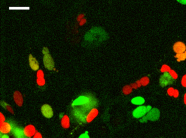Systems Biology Major | Masters Degree at BioQuant
Following the identification of the parts of biological systems, the interdisciplinary field of systems biology combines quantitative data generation and mathematical modelling to elucidate general principles governing emergent properties of complex systems that give rise to biological functions. Due to the non-linearity of relationships in biological networks it is not possible to deduce function from the properties of individual molecules but rather by considering the dynamic interplay of systems components.
Major open questions are:
- How is information processed and linked to cell fate decisions?
- How is specificity achieved?
- Which parameters determine the robustness of biological systems?
The approach of systems biology is fuelled by tremendous advances in high-throughput data generation and in the analysis at the single cell level in combination with the development of suitable modelling tools. Systems biology facilitates the establishment of new paradigms and the identification of targets for efficient intervention. Thereby, it holds outstanding promise for biomedical research, which is a major topic in Heidelberg.
The Major Systems Biology covers fundamental topics in cell biology, molecular biology, dynamic pathway, as well as multi-scale modelling, bioinformatics and computational analysis. In-depth training in multi-disciplinary approaches will be provided by lectures, tutorials and seminars that are accompanied by practical courses. Thereby, the Major Systems Biology uniquely prepares students for developing novel strategies to address key questions in biological systems.
More information about Systems Biology in general can be found on the website: www.systembiologie.de. Although the site is in German, some of the digital magazines mentioned there are in English.
Program Directors
Program Coordinator
Staff and Research Groups
These groups are associated to the Systems Biology major. Students are very welcome to do a traineeship or write their master's thesis with one of these groups. Please check the different websites to find out more about the research themes and the specific contact details.
Research Group | Group Leader |
Simon Anders | |
Ilka Bischofs | |
Holger Erfle | |
Thomas Höfer | |
Supriya Khedkar | |
Ursula Klingmüller | |
Ursula Kummer | |
Anna Marciniak | |
Jürgen Pahle | |
Karsten Rippe | |
Karl Rohr | |
Rob Russell | |
Julio Saez-Rodriguez | |
Denis Schapiro | |
Rasmus Schröder | |
Almut Schulze | |
Vytaute Starkuviene-Erfle | |
Jovan Tanevski | |
Institut für Pharmazie und Molekulare Biotechnologie Abteilung Pharmazeutische Biologie | Stefan Wölfl |
Coordinator Insights
Prof. Dr. Ursula Kummer
"Systems biology research requires a structural rethinking. Scientists from the lab and model builders have to get together to learn from each other"
Prof. Dr. Ursula Klingmüller
"Biological systems are very complex. It is not sufficient to focus solely on individual components but rather they have to be put in context to understand how emergent properties such as cellular decisions arise. Therefore interdisciplinary approaches combining theoretical and experimental techniques will be of increasing importance to address big questions in basic and translational research."


